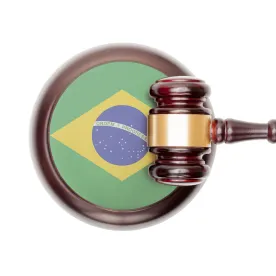Overview
A recent spate of cases on both sides of the Atlantic in 2023 show that criminal enforcement and asset recovery proceedings stemming from the iconic Brazilian anti-corruption investigation, Operation “Car Wash” (Lava Jato), are ongoing outside of Brazil’s borders. As is typical in the largest international investigations, international enforcement continues after the conclusion of the domestic investigation. In this article we highlight recent Car Wash-linked cases in both the UK and U.S. courts, and provide an update on the long-running investigation led by the Swiss Attorney General.
Notwithstanding significant political controversy surrounding the case in Brazil and speculation on a broader slowdown of anti-corruption activity by domestic authorities, international proceedings linked to Car Wash continue. There are two primary reasons for this. First, corruption investigations of this scale and complexity have multiple international touchpoints and a long tail; asset recovery processes and proceedings against individuals domiciled outside of Brazil occur after (and in certain cases rely upon) the convictions in domestic criminal processes. Second, the strong relationships that the Brazilian authorities established with their international counterparts throughout Car Wash continue to endure and inform enforcement activity in cooperative jurisdictions. The cases highlighted below clearly demonstrate that UK, U.S. and Swiss enforcement authorities continue to collaborate with their Brazilian counterparts and emphasize the ongoing importance of Brazil in global anti-corruption enforcement.
The purported cessation of active enforcement led by Brazilian domestic authorities may have been overstated and premature. In January 2023, the major Brazilian retailer, Americanas SA, collapsed suddenly with debts of BRL 40 billion (~ USD 7.7 billion), amidst allegations of fraud, in circumstances that have been compared to the Enron scandal.1 The insolvency has created significant exposure for institutional lenders, a broader credit squeeze in the Brazilian corporate debt market2 and generated outrage in the media. The Americanas case has already generated extensive insolvency proceedings, civil litigation and appears likely to lead to criminal investigation and prosecution in Brazil and beyond.
Background
The largest corruption case in Brazil’s history, Operation Car Wash (Lava Jato), began in March 2014. Over six years and 79 investigative “phases”, prosecutors revealed deep systemic corruption at the heart of the Brazilian state-owned oil company, Petrobras, involving politically appointed executives and a cartel run by the largest infrastructure conglomerates in Latin America. According to the Federal Prosecution Office (MPF) database, the investigation resulted in 361 convictions at first instance and billions of dollars in fines and financial settlements with companies involved.3 Leading members of the Brazilian business and political elite were convicted at first instance, including the current President, Luiz Inácio “Lula” da Silva.
Car Wash had and continues to have a very significant international dimension. During the course of the investigation, Brazilian prosecutors worked effectively with counterparts in 41 countries and responded to more than 650 formal requests for legal cooperation.4 During the lifetime of the Brazilian investigation, this close cooperation led to some of the largest global corporate resolutions in history. In December 2016, Odebrecht SA, a global construction conglomerate based in Brazil, and Braskem SA, a Brazilian petrochemical company, pled guilty and agreed to pay a combined total penalty of at least $3.5 billion to resolve charges with authorities in the United States, Brazil and Switzerland.5
As the Brazilian investigation dragged on, allegations of procedural impropriety and political partiality on the part of the presiding judge and prosecutors undermined public support. The Car Wash prosecutorial task force was wound up in February 2021 and Lula’s conviction was annulled on procedural grounds by the Brazilian Supreme Court in April 2021 which cleared the way for his re-election to a third presidential term in October 2022.
Since assuming office in January 2023, Lula has provoked concern by amending the Brazilian State-Owned Companies Act which had prohibited serving politicians or political appointees from directing state-owned companies. In the wake of this reform, Lula has nominated political appointees to lead Petrobras and the Brazilian development bank, BNDES. Proceedings have also been initiated against judges responsible for the Car Wash investigation including Federal Judge, Marcelo Bretas, who was removed from office following a decision by the National Council of Justice (CNJ) on February 28.6
United Kingdom
On February 13, 2023, the UK’s Serious Fraud Office (SFO) applied to Westminster Magistrates’ Court to seize over $8 million in assets from Mario Ildeu De Miranda, a former Petrobras engineer.7 The SFO traced $7.7 million and £698,600 ($847,400) held in two accounts at EFG Private Bank, a Swiss private bank, which has branches in cities around the world, including London. The SFO allege Miranda received over $24 million in bribe payments from Odebrecht. Miranda was previously convicted in Brazil of 37 counts of money laundering for onward transfers of $11.5 million to Petrobras staff and was sentenced, after a reduction on appeal, to four years and 10 months imprisonment.
During the Westminster Magistrates hearing, Miranda denied knowledge of bribery and explained that payments to his consultancy company, Belize Tech Trade Corp., for hotels in Las Vegas were legitimate business expenses incurred to “motivate” his business partners. The SFO allege that there was a “clear path” of funds being transferred from Odebrecht to Belize Tech Trade Corp. and then continuing onwards via a series of offshore entities before arriving in Miranda’s Swiss EFG Private Bank account. The SFO argue that Miranda provided “money laundering consulting services” to Odebrecht. Judgment is expected later this year.
The Miranda case is another example of UK recovery proceedings linked to Car Wash. As we previously reported, in November 2020, the SFO reached a £1.2 million civil recovery settlement with Julio Faerman, a Brazilian national linked to Car Wash.8 During its investigation, the SFO obtained a freezing order together with a disclosure order. Faerman acted as the Brazilian agent for the Dutch oil services company, SBM Offshore NV, and as part of a 2016 settlement with the Brazilian Public Prosecutor admitted paying bribes to win contracts with Petrobras. Faerman was subject to a cooperation agreement with Brazilian authorities and paid a financial settlement of $54 million.
The SFO has broad powers under the Proceeds of Crime Act 2002 (POCA) to seize assets from individuals and organizations. Part 5 of POCA establishes a regime for the civil recovery of the proceeds of crime and includes the power to apply for a property freezing order pending the outcome of any civil recovery proceedings. Persons working in a regulated sector (e.g. financial sector firms, auditors, tax advisers) are obligated under Part 7 of POCA to submit a Suspicious Activity Report (SAR) to the National Crime Agency in respect of information that comes to them during the course of their business. In the case of Miranda, it is not known whether the SFO’s investigation was started due to the filing of a SAR. A person working in a regulated sector must submit a SAR if they know, or suspect, or have reasonable grounds for knowing, or suspecting, that a person is engaged in, or attempting, money laundering. Furthermore, a Nominated Officer9 in a non-regulated sector may be committing an offence if they have knowledge of, or suspicion of, money laundering activity, or if they do something to assist another in dealing with it, and fail to submit a SAR.
These powers were bolstered by the Criminal Finances Act 2017 and the introduction of Unexplained Wealth Orders (UWO). These orders, can be sought by UK law enforcement in respect of assets valued in excess of £50,000 where there are reasonable grounds to suspect that the asset was purchased with illegitimate funds. Most importantly, the onus is on the defendant to prove that the funds used to purchase the assets are legitimate. UWOs can be made against politically exposed persons or individuals suspected of being involved in serious crime in the UK or abroad, together with their associates.
Since March 2022, “UWOs have been granted in four cases in relation to assets with a combined value of £143 million. In October 2020, property worth an estimated £10 million was recovered following the use of an UWO.”10
United States
On February 17, 2023, the Department of Justice (DOJ) announced the unsealing of an indictment in the District of Connecticut charging Glenn Oztemel, a former oil trader, and his alleged intermediary Eduardo Innecco.11 Prior to retiring in 2020, Oztemel worked for Connecticut-based Freepoint Commodities as Fuel Oil Book Head for U.S. operations. Innecco also worked for Freepoint as a consultant. The DOJ claim that Oztemel and his co-conspirators caused two Connecticut-based trading companies to make corrupt payments to Innecco, knowing that Innecco would pay a portion of those funds to Brazilian officials as bribes. These payments were disguised as purported consulting fees and commissions. The indictment states that coded language was used to refer to bribes and bribe amounts in order to conceal the scheme.12 In addition, Oztemel, Innecco and their co-conspirators allegedly used personal email accounts, fictitious names, and encrypted messaging applications to communicate, particularly regarding confidential Petrobras information. The DOJ assert that Innecco sent bribes to three officials including Rodrigo Berkowitz, a former Houston-based Petrobras trader who pleaded guilty to receiving bribes in 2019. Berkowitz, whose sentencing is scheduled for April 27 in Brooklyn federal court, told Brazilian authorities that he gave information to Freepoint employees which included how much their rivals were bidding in Petrobras fuel auctions. Court documents suggest Oztemel caused the Connecticut-based companies to send at least $436,000 to companies under the control of Innecco.
On January 27, in the Eastern District of New York, the sons of former Panamanian president Ricardo Martinelli were ordered to forfeit almost $38 million for their involvement in a scheme to bribe a Panamanian government official in exchange for awarding business to Odebrecht, the Brazilian construction conglomerate. The orders against Ricardo Alberto Martinelli Linares13 and Luis Enrique,14 also include the contents of two bank accounts and an attorney escrow account in Switzerland. Criminal Division chief Kenneth Polite stated in May 2022 that the brothers had directed “millions of dollars in bribes” to “their own Swiss bank accounts”.15 Prosecutors stated that the brothers acted as intermediaries for approximately $28 million in bribes paid by Odebrecht to a high-ranking government official, who was a close relative of the brothers, from 2009 to 2014. The brothers pled guilty in December 2021 and were each sentenced to a three-year custodial sentence in May 2022.
Switzerland
In February 2020, a Swiss court delivered the first Swiss conviction relating to the Car Wash. A Swiss-Brazilian national was handed a suspended 16-month custodial sentence and ordered to pay CHF 1.6 million in fines and court costs. The authorities stated the individual was suspected of acting as a financial middleman and complicit in the bribery of public officials. Swiss prosecutors have opened over 60 criminal proceedings which include several investigations against Swiss financial institutions. In 2018, PKB private bank was ordered to surrender CHF 1.3 million in illegally obtained assets.
In its 2021 Annual Report,16 the Office of the Attorney General (OAG) of Switzerland stated that the Car Wash-related cases remained one of the priorities of the OAG’s White-Collar Crime Division. The first two phases of the OAG’s investigations focused on the recipients of the payments and on the persons who arranged these payments. The report states that due to the scope of these investigations, work on the first two phases was still ongoing, but that many proceedings had already been concluded. The report explains that the OAG is also conducting a third phase of investigations, which focuses on the criminal liability of financial intermediaries in Switzerland. The OAG reports that contrary to the trend of previous years, the number of mutual assistance requests delegated by the Federal Office of Justice to the OAG increased only slightly and at the same time significant progress was made with the execution of mutual assistance requests.
In March 2022, the Geneva office of Swiss private bank Pictet was searched by Switzerland’s Office of the Attorney General as part of its investigation into corruption relating to Petrobras which were opened in December 2021.
FOOTNOTES
1 Bloomberg - Americanas Implosion Prompts Banks to Set Aside $1.8 Billion.
2 Bloomberg - Brazil Credit Crunch Is Brewing as Americanas Fallout Grows.
3 Reported first instance convictions in Curitiba, Rio de Janeiro and São Paulo - https://www.mpf.mp.br/grandes-casos/lava-jato.
4 https://www.mpf.mp.br/grandes-casos/lava-jato.
7 R v. Mario Ildeu De Miranda - case number 2201403386.
8 UK Settlement Highlights International Enforcement Linked to “Car Wash” Investigation.
9 A nominated officer is a person who is nominated to receive and consider SARs under the Terrorism Act 2000 and the Proceeds of Crime Act 2002.
16 OAG annual reports - https://www.bundesanwaltschaft.ch/mpc/en/home/taetigkeitsberichte/taetigkeitsberichte-der-ba.html





 />i
/>i
